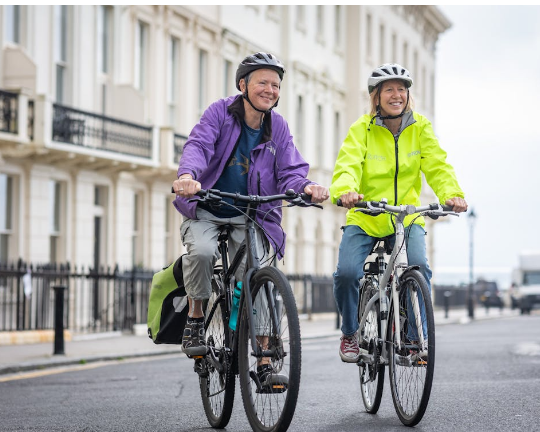Senior Cyclists, Here’s Why a Backup Plan Trumps Heroics

Cycling is one of the best ways to stay active as we get older. The open air, the rhythm of the ride, and the sense of independence are hard to beat. But staying on two wheels also comes with risks. Falls happen, even to the most careful riders. And when they do, pride and “toughing it out” are not always the smartest choices.
That’s why having a backup plan matters. While a tuned-up bike and clear route can help, you also need something in your corner when the unexpected strikes. A service like Life Assure shows how technology can support older cyclists who want peace of mind on every ride. It’s not about fear. It’s about riding with confidence knowing there’s help if you need it.
Why Seniors Should Think Differently About Bike Safety
Younger riders often bounce back quickly from scrapes. Older cyclists, though, face longer recovery times and higher risks of complications after falls. A broken bone or a head knock can take months to heal. For seniors who live alone or ride on less-traveled roads, waiting for help can make a tough situation worse.
Thinking ahead doesn’t mean giving up freedom. It means protecting it. By adjusting expectations, using the right equipment, and keeping an emergency plan, you can extend your cycling years without unnecessary risks.
Preparing Before You Pedal
The smartest backup plan begins before your tires touch the pavement. A few small steps can prevent accidents or reduce their impact:
- Check your tires: Worn or underinflated tires are more likely to slip or puncture.
- Test your brakes: Brakes that grab unevenly or too late can cause a dangerous stop.
- Choose the right route: Smooth, well-lit paths beat traffic-heavy or uneven terrain.
- Ride at your pace: Avoid pushing harder than what feels steady.
These steps may sound basic, but they’re often skipped in the excitement of a ride. Making them habits gives you more control and less chance of a mishap.
When Prevention Isn’t Enough
Even with preparation, accidents still happen. A loose dog, a slick patch of road, or a moment of fatigue can send a cyclist off balance. For older riders, the challenge isn’t just falling—it’s what comes next.
That’s where a backup plan is essential. Having an emergency contact or alert device means you don’t need to rely on luck or passersby. It puts you in control of the response, even if you can’t move easily after a fall.
The Role of Modern Alert Devices
Many senior riders carry phones, but unlocking a screen or finding a signal isn’t always easy in a stressful moment. Wearable alert systems step in here. These small, lightweight devices allow a rider to call for help with one push. Some also include GPS tracking and automatic fall detection.
For cyclists, this is a quiet form of support. You don’t notice the device when you’re riding, but it’s there if you need it. Instead of worrying about “what if,” you get to enjoy the ride more fully.
Balancing Confidence with Care
It’s natural for seasoned cyclists to feel pride in their resilience. Many have decades of riding behind them, and letting go of that “I’ll be fine” mindset can be tough. But care and confidence don’t have to clash. Having backup support doesn’t make you weak. It shows wisdom.
Think of it as carrying a spare tube or a first aid kit. You don’t plan to use it, but you’re glad it’s there if the day goes wrong. A monitored alert device works the same way—quietly extending your ability to ride independently while giving family members peace of mind too.
Practical Ways to Add a Backup Plan
Adding safety measures doesn’t need to be complicated. Here are a few practical steps senior cyclists can take:
- Ride with a buddy when possible: Two sets of eyes catch more risks.
- Keep ID and medical info on hand: A small card in your jersey can make a big difference.
- Use visible gear: Bright clothing and lights reduce the chance of being missed by drivers.
- Pair safety with technology: Wearable alert systems or phone apps bridge the gap when you’re alone.
The goal isn’t to limit your riding. It’s to make every ride more secure.
Why Backup Plans Extend Freedom
The irony of safety planning is that it doesn’t hold you back. It sets you free. Knowing you’ve prepared for the worst lets you focus on the joy of the ride. Instead of worrying about “what if,” you can explore new routes, ride longer, and enjoy the independence cycling brings.
A fall may not be avoidable, but its outcome doesn’t have to be left to chance. With the right mindset and the right tools, senior cyclists can keep pedaling confidently for years to come.

Closing Thoughts
Heroics make for good stories, but smart planning makes for better rides. Senior cyclists don’t need to push through pain or rely on sheer willpower when something goes wrong. With steady habits, reliable gear, and an easy way to call for help, you can enjoy every mile with greater security.
Cycling is about freedom, and a good backup plan protects that freedom—not just for today’s ride but for the many rides still to come.
